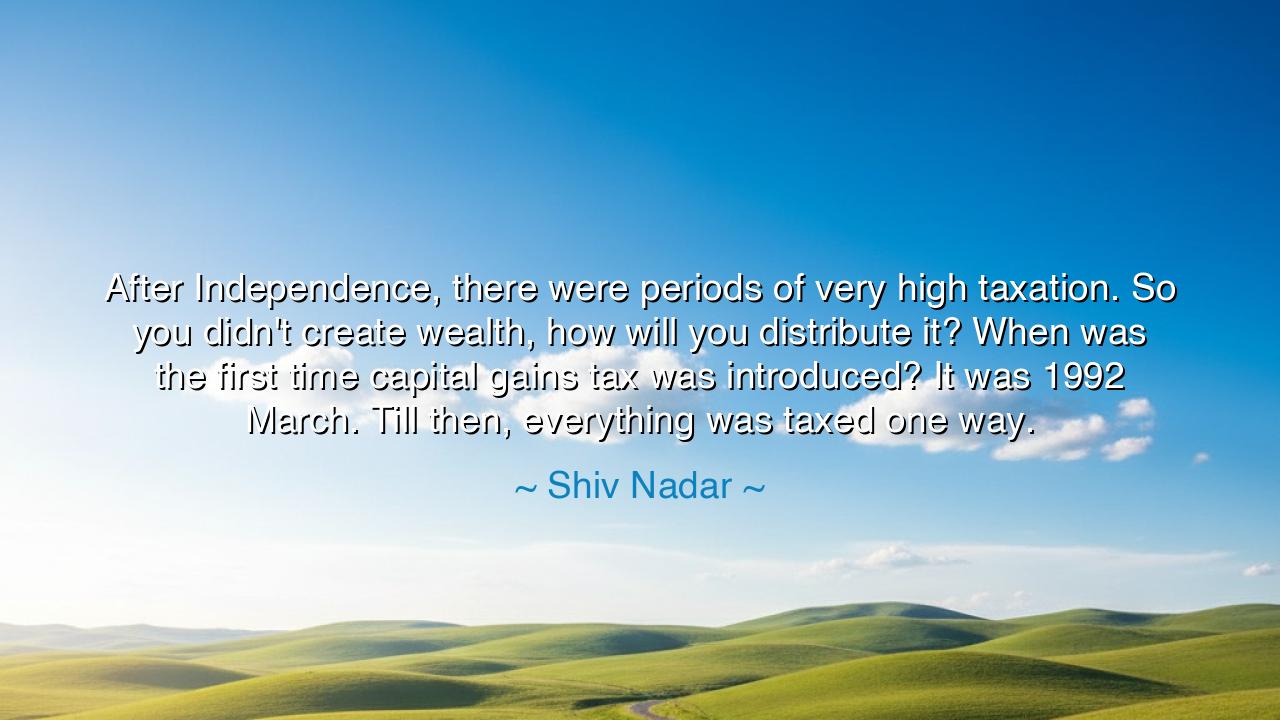
After Independence, there were periods of very high taxation. So
After Independence, there were periods of very high taxation. So you didn't create wealth, how will you distribute it? When was the first time capital gains tax was introduced? It was 1992 March. Till then, everything was taxed one way.






The words of Shiv Nadar, when he said, “After Independence, there were periods of very high taxation. So you didn't create wealth, how will you distribute it? When was the first time capital gains tax was introduced? It was 1992 March. Till then, everything was taxed one way,” carry not only the wisdom of an industrialist but the insight of a philosopher who understands the rhythm between creation and distribution, between freedom and responsibility. Beneath his observation lies a timeless truth — that prosperity cannot be shared if it has never been built, and that wealth, when shackled by excessive constraint, loses its power to uplift a nation. His words are not a mere commentary on economics, but a reflection on the nature of progress itself.
In speaking of the time after Independence, Nadar refers to a nation newly born from centuries of foreign rule — a country eager to define its own destiny, yet burdened by the weight of poverty and fear of inequality. The leaders of that age sought fairness, but they mistook fairness for uniformity. Heavy taxation fell upon enterprise like a chain, restraining the very forces that could have built abundance. To many, wealth became suspect; to create and accumulate was seen as selfish. Yet, as Nadar reminds us, “you didn’t create wealth — how will you distribute it?” His question pierces through the fog of ideology to reveal a simple, elemental truth: creation must precede sharing, and progress must be nurtured before it can be divided.
The introduction of the capital gains tax in March 1992 marked not just a policy shift, but a spiritual awakening in India’s economic life. It came during a time of transformation — when the walls of protectionism began to fall, and the country stepped into the light of liberalization. The year 1991 had brought crisis and revelation: the reserves were empty, but the will to reform was full. It was a moment when India realized that wealth, like knowledge, multiplies only when freed. Nadar’s recollection of that year is not nostalgia; it is reverence for a turning point — the dawn of a new balance between creation and contribution, between freedom and fairness.
This struggle between wealth creation and social justice is not unique to India; it is a story as old as civilization. In the days of ancient Athens, the philosopher Solon faced a city divided between the rich and the poor. The poor were enslaved by debt, the wealthy despised for their hoarding. To heal his people, Solon reformed both law and economy: he forgave the unpayable debts, but also restructured society to allow enterprise and labor to flourish together. He understood what Nadar echoes centuries later — that if you destroy the power to create, you destroy the power to care. For wealth is not evil when it serves the common good; it becomes evil only when hoarded or stolen.
In the years following India’s independence, noble intentions often met tragic results. The desire to prevent exploitation led to stifling regulation, and the dream of equality became tangled in bureaucracy. The entrepreneur, once a symbol of ingenuity, became a suspect figure. Factories slowed, innovation dimmed, and a generation of visionaries found their wings clipped. But by the 1990s, a new wind began to blow — the wind of economic reform, led by those who understood that freedom of enterprise was not the enemy of justice, but its ally. Nadar himself, founder of HCL, was among those who seized that wind and steered it toward the dawn of India’s modern economy.
The heart of Nadar’s message, however, extends beyond economics. It is a lesson about the natural order of growth in all things. Just as a tree must take root before it gives shade, a nation must build before it can share. To punish creation is to poison the well of prosperity. The wise ruler — or citizen — understands that wealth, when guided by ethics and vision, becomes a force for enlightenment: it educates, it empowers, it uplifts. But when crushed by suspicion or envy, it vanishes, leaving behind only scarcity and despair. Nadar’s words remind us that generosity cannot spring from emptiness, and progress cannot be born of restraint.
So, O listener, learn from this teaching. Do not despise success, nor fear ambition. Honor the one who builds, for through his labor, others find opportunity. But let creation always walk hand in hand with conscience — let the hand that earns also give. For independence is not only political; it is also economic, moral, and creative. The true patriot is not merely he who waves the flag, but he who builds the foundation on which the flag stands strong.
Thus, the wisdom of Shiv Nadar endures: that wealth creation and wealth distribution are not opposing forces, but twin duties of a civilized people. To build is sacred, to share is divine — and only when a nation learns both arts does it fulfill the promise of its freedom. Let us, then, create without greed and distribute without resentment, so that the fruits of our independence may feed generations yet unborn.






AAdministratorAdministrator
Welcome, honored guests. Please leave a comment, we will respond soon